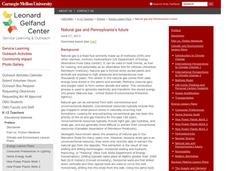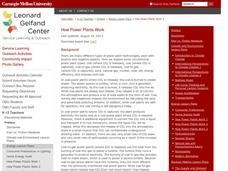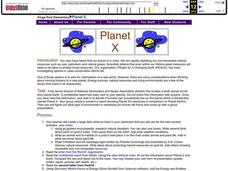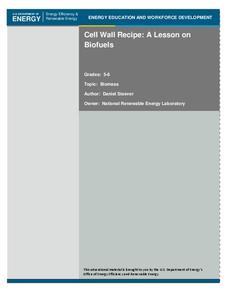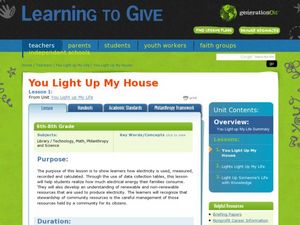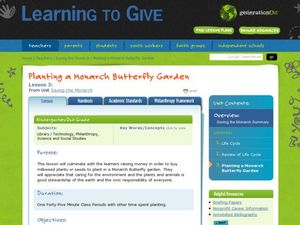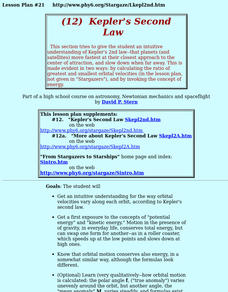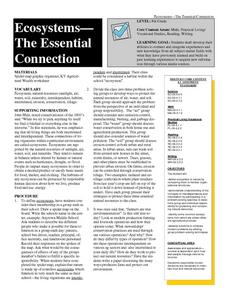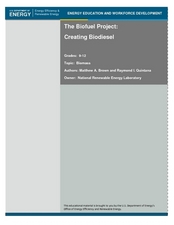Curated OER
The Envelope System: A Partial Solution
Studnet identify examples of conduction, convection and radiation. They develop an example of a building envelope. They also describe how heat transfer mechanisms can affect home energy costs.
Curated OER
Paper or Plastic: Exploring Renewable Resources.
Students discuss, develop, invent, and implement a plan for making informed personal economic decisions about renewable resources.
Curated OER
Is Climate Change Good for Frogs?
Learners fill out a chart on how climate change would affect them and things around them. In this climate change lesson plan, students discuss how global warming affects them and amphibians and then fill out the chart that goes with it.
Carnegie Mellon University
Natural Gas and Pennsylvania’s Future
Beginning with a general discussion about natural gas, methane, and hydrocarbons, a few videos and diagrams are projected to support the lecture. Individuals participate in a brief activity by drinking juice through a straw, and then...
Carnegie Mellon University
How Power Plants Work 2
For this second of three lessons on power plants, future engineers find out how we generate electricity and how coal-powered plants operate. They work in small groups to make electromagnet generators to light LED bulbs. A set of...
Carnegie Mellon University
How Power Plants Work 3
Double, double toil and trouble, fire burn and cauldron bubble! Find out what drives a turbine to generate electricity and whether or not it has an impact on the environment. A discussion and lecture is divided by a hands-on activity in...
Curated OER
Nonfiction Genre Mini-Unit: Persuasive Writing
Should primary graders have their own computers? Should animals be kept in captivity? Young writers learn how to develop and support a claim in this short unit on persuasive writing.
Curated OER
Campus Nitrogen Budget
Students are given guidelines to college level nitrogen budgeting. Students brainstorm the campus links to nitrogen budget. Students pick topics or subtopics for individual or group research. Students develop research plan, keep good...
Curated OER
Planet X
Students select a wide variety of presentation methods to compare Planet X and Earth. Students share these with their classmates. Students select other methods to present their ideas about a livable planet for human life forms. ...
Curated OER
Warming by Freezing
Ninth graders discover the reasoning behind spraying water on fruit and seedlings in preparation for hard freezes. In this conceptual physics lesson plan, 9th graders conduct an experiment to measure the heat released when water goes...
Curated OER
Cell Wall Recipe: A Lesson on Biofuels
Biotech engineers discover that changes in the DNA code for cell wall formation can help create crops better suited for biofuel production. They extract DNA from wheat germ. They decode paper strips with codes and relate the activity to...
Curated OER
Momentum
Students learn the concepts of momentum and its conservation, using the recoil of a cannon as an example. They examine how momentum is a vector, allowing its conservation to be applied to problems in 2 and 3 dimensions.
Curated OER
You Light Up My House
Students explore renewable and nonrenewable resources. In this electricity lesson, students consider way to reduce the energy that they use as they chart and analyze their own electricity usage.
Curated OER
Planting a Monarch Butterfly Garden
Young scholars raise money to purchase milkweed plants for their butterfly garden. In this gardening lesson, students listen to the story Miss Rumphius to determine why it is important to plant milkweed for butterflies. Young scholars...
Curated OER
The Importance and Future Of Canadian Resources
Ninth graders examine Canadian natural resources. In this geography skills lesson plan, 9th graders research answers to questions regarding Canada's water, energy, forests, and wildlife. Students use their findings to create posters that...
Benjamin Franklin Tercentenary
Benjamin Franklin’s Community Contributions
Students research Benjamin Franklin's community contributions. For this social studies lesson plan, students create a collage showing things they can do to improve their communities.
Curated OER
Celt Spoon
Students investigate the invention of a celt spoon. They construct their own in order to make observations. This should include the spinning in opposite directions than that which it is sent. The construction instructions are included in...
Carnegie Mellon University
Marcellus Shale: Who Pays?
After viewing short clips of unfortunate events, your class will consider two sides of a homeowner's court case, and then learn about the Marcellus shale deposit beneath the state of Pennsylvania and the hydraulic fracturing process. In...
Curated OER
Kepler's Second Law
Students gain an understanding of Kepler's 2nd law--that planets (and satellites) move fastest at their closest approach to the center of attraction, and slow down when far away. They explore the concepts of "potential energy" and...
Curated OER
Everyday vs. Extreme Relationships with Nature
Students examine the interactions with nature and the environment. They discover where water comes from and ways to conserve water. They also examine energy sources and consumption.
Curated OER
My Dream Home
Students investigate the concept of a dream home and create an architectural drawing of it. They design the home with a projected budget of $500,000. They research different designs with the intent of pulling ideas for their design....
Curated OER
Where Has All the Water Gone?
Young scholars identify how we use water everyday. They determine the amount of water used in different activities. They finally explain why the water supply is limited and how we can conserve water.
Curated OER
Ecosystems-The Essential Connection
Students develop their abilities to solve problems both in school and in a variety of situations similar to that they have encountered in life. They define the term ecosystem in nature by comparing them to familiar organizational...
Curated OER
The Bio-fuel Project: Creating Bio-diesel
Students investigate bio-fuel. In this investigative lesson, students create bio-fuel from vegetable oil waste. Students will analyze, predict, collect and synthesize data from their experiments with bio-fuel.





